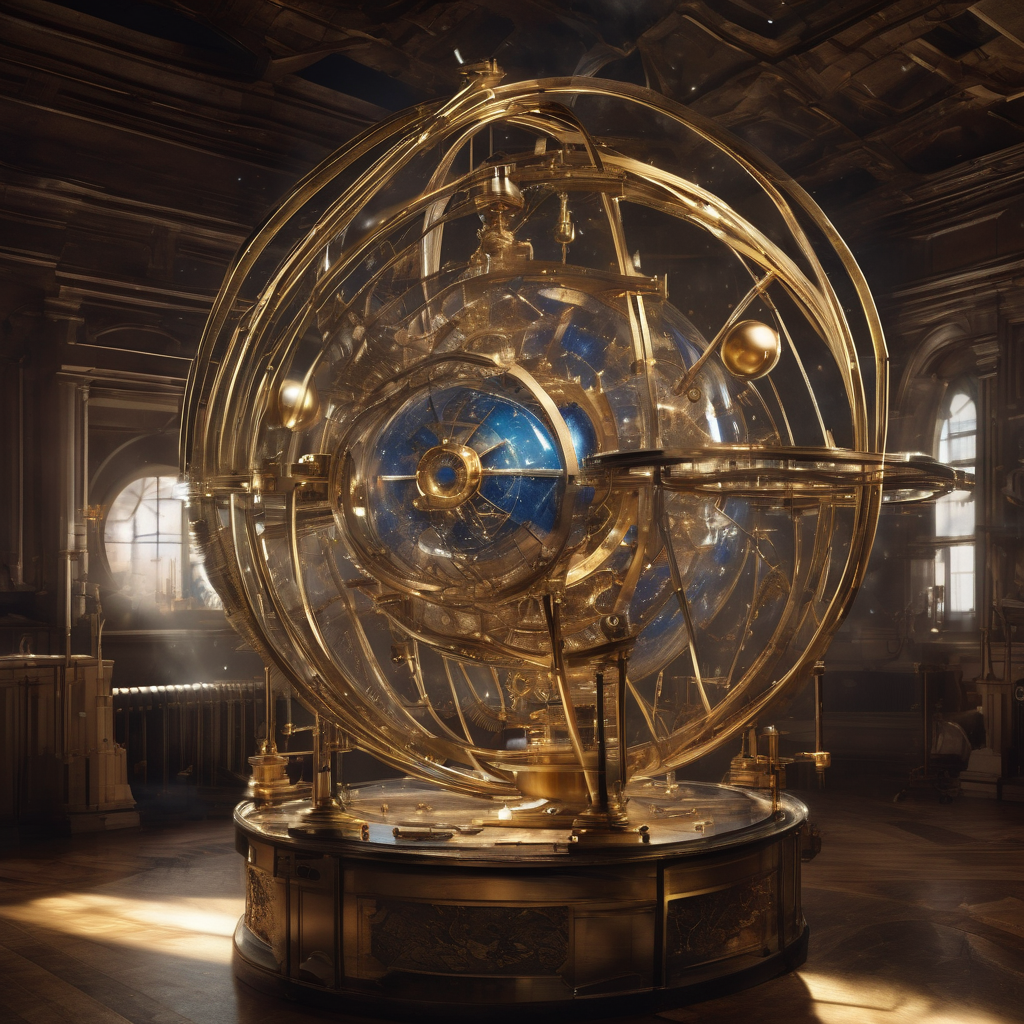Kael polished the little sapphire world between his thumb and forefinger until it shone. Below, on its surface, empires rose and fell in a shimmer of accelerated time. He sighed, a sound like the shifting of tectonic plates, and placed it back on its spindle. The great orrery, his universe, clicked and whirred around him in the infinite dust of the attic.
He had been at this for an eternity. Forging nebulae from thought, spinning galaxies from boredom. Now, however, the work had lost its luster. He was, for lack of a better term, quiet-quitting Godhood. He kept the basic laws of physics running, ensured gravity didn’t take an unscheduled holiday, but he hadn’t created a new species in millennia. He’d let himself slip into a sort of cosmic goblin mode, content to let the old systems run down, wearing the same filament-thin robe day in and day out.
For a bit of novelty, he’d recently focused on a single being. A woman on a verdant, overlooked world called Lyra. This new one, Elara, he’d imbued with an unfair amount of what the fleeting ephemera on Earth-Bet had started calling ‘rizz’. He’d woven it into her code: a particular tilt of the head, a laugh that could disarm armies—which it had, twice. He’d made her devastatingly charming just to watch the narrative possibilities unfold.
The problem was, it was working on him.
He’d watch her for cycles on end, forgetting to stoke the core of a dying sun in the next spiral arm over. He’d project a sliver of his consciousness down, a phantom stranger she’d meet in a rain-slicked market, and find himself lost in their conversations. She spoke of a profound, gnawing loneliness, a sense that the world was a beautiful but hollow stage piece. He felt a pang of guilt. He had written that ache into her, a classic trope for a compelling protagonist. But when she looked at his phantom form with those searching, intelligent eyes, it felt less like a trope and more like an accusation.
It had become a strange, unclassifiable thing, this obsession. A situationship with a figment of his own imagination. He knew every line of her, every thought he’d scripted for her, yet he found himself hoping she would surprise him. He was actively manifesting a rebellion in his own creation. He was delulu, that was the word for it, a term he’d plucked from the same buzzing hive-mind as the other. Hopelessly delulu for a woman he’d built from stardust and narrative convenience.
One cycle, she stopped speaking to the phantom. Instead, she started talking to the sky.
“I know you’re there,” she said, standing on a cliff overlooking a turquoise sea. “The sun feels like a lamp. The stars feel like holes punched in a lid. This whole world is giving… diorama.”
Kael felt a cold dread snake through him. This wasn’t in her script. He frantically scanned the intricate cogs and jeweled pivots of the orrery, looking for a crossed wire, a faulty gear. There was none. Her tiny, perfect form on the sapphire world of Lyra was acting of its own accord.
“Are you gaslighting me?” he whispered to the whirring machine, the words absurd even to him. How could his creation manipulate him? Yet, her words made him question the very nature of the attic. Was the dust his, or had he simply woken up in it?
An old philosopher on Lyra, a character Kael had designed to be a font of cynical wisdom, was overheard in the marketplace. “The Queen has entered her mad era,” he’d mumbled to a crony. “Staring at the sky, speaking to an imaginary audience. She claims the world isn’t real. Frankly, it’s giving Götterdämmerung.”
The finality of the word chilled Kael more than the silence of deep space. One night, he watched as Elara stood on the highest peak of Lyra. She reached up a hand, not to the air, but to the very concept of sky.
“I am not a story,” she said, her voice a thread of sound Kael could hear in the vastness of his workshop. “And I will not be read.”
Her fingers touched the firmament.
In the attic, the sapphire jewel of Lyra began to vibrate, emitting a low, harmonic hum that resonated through the entire orrery. A hairline crack appeared on its surface. Kael lunged for the control lever, the one marked ‘reset’, the ultimate tool of editorial control that would wipe Lyra clean and start again. His hand trembled inches from it. All his loneliness, his ennui, his quiet quitting, it had all been a prelude to this. Remain a solipsist, alone in a predictable clockwork world, or face the terrifying possibility that he was not, in fact, alone at all.
He pulled his hand back.
The crack on the sapphire didn’t shatter it. Instead, a light, pure and white and utterly new, poured out. It wasn’t the light of his forge-stars. It was something else. The light solidified, weaving itself into the orrery’s mechanism, forming a new, impossibly intricate gear that clicked into place beside Lyra, a gear Kael had not designed. The entire machine shifted its rhythm, its celestial hum deepening into a duet.
Kael looked at his hands, then at the transformed orrery. It was no longer just his. On the surface of the sapphire, Elara lowered her hand from the sky and, for the first time, looked directly up, beyond her world, beyond the crystal sphere, and met his gaze. She smiled, a real smile, one he hadn’t written. The dust in the attic began to settle.

Leave a Reply